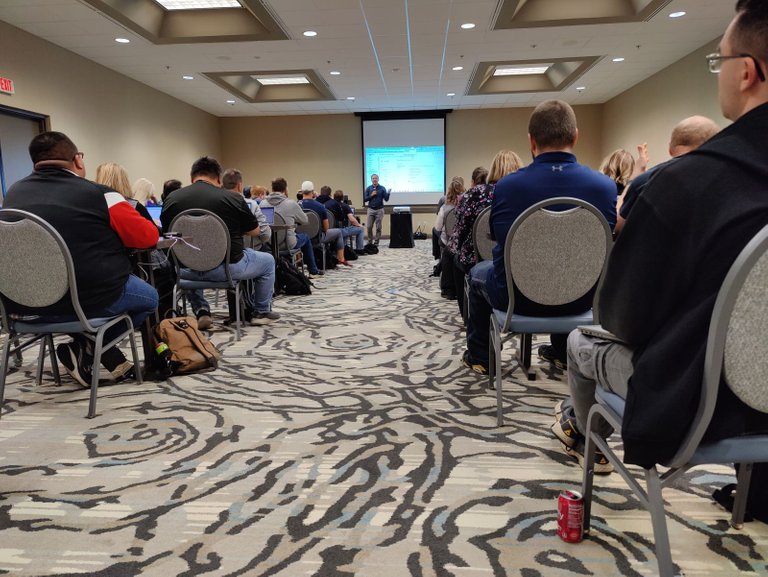 That's not me in the photo
That's not me in the photoSomewhere along the line, businesses started to move to this model of "Training the trainer". Basically, instead of having to send one of their employees onsite to train everyone, they train one or a handful of people from your organization and they in turn train the rest of the organization.
This has become really popular in the K-12 space because it is a huge money saver. Instead of paying for a fancy trainer, you can just use someone that you are already paying anyway. In theory, it isn't that bad of an idea. In practice... people are jerks and not everyone has the skills they need to do the job well.
I'd fall into that later category. I am not a great public speaker, I will be the first to admit that. I've been told that I do a better job than I think I do, but the fact remains it isn't something I enjoy or am comfortable with. In fact I often work myself up so much that I am physically sick before I have to do something like this.
Part of me wishes I had taken one of those classes back in the day about how to make friends and influence people. Perhaps one of those Dale Carnegie things or "Toastmasters". I think my brother in law was/is a member of Toastmasters and he is a quite good public speaker. Some people are just born that way too.
Anyway, I recently purchased some software that is to be implemented district wide in our public school. It's a tool that teachers can use to help manage the student devices in their classroom more easily. While not something they specifically asked for, it is definitely something that will be beneficial to them if they give it a chance.
I have three groups of people who I need to get through the training and so far I have two of them done. It's interesting, because the training isn't particularly long (20 minutes tops), but the reception has been mixed at best. I still have my biggest group ahead of me and that has me a bit more nervous than I would normally be.
I learned a couple of things from the first two training sessions that I am planning on applying to my future one:
You know how people say "I could never be a teacher, kids are just horrible these days".
Let me assure you right now, adults are worse. If I had a dollar for every snarky comment, side conversation, and disrespectful behavior from teachers when I am training them, I would be doing something different with my life.
In fact, if the students acted in their classroom the same way these teachers do in training, they would be irate. Those students would be sent down to the principal so fast. It's like they can't see the parallels at all. It's sad and honestly one of the things I hate the most about doing trainings.
Secondly, it's amazing to me how one person can totally derail a perfectly good training. I had this happen just a short time ago and it made me think about how @tarazkp must react in situations like this. Of course, he does this sort of thing for a living, so I am sure he has all kinds of tricks and tips to keep things on course.
So I was going through my presentation and there was one staff member who was hung up on the fact that her class list was missing a student. That's right, one single student, not her whole class, not half her class. The result ended up being, she missed the remainder of my training (80%) of the whole presentation, because she was so focused on that one student.
Additionally, she sucked all of those around her into her issue and they likely missed the important stuff too.
Looking back, I wonder if I should have stopped the training and let the teacher know that we would figure out where the missing student was at a later time, just follow along now with the students you do have.
Have you been in a situation like that? How would you handle it?
Knowing we could run into this with my final group, I already have a plan to address the fact that all students may not show up. I am sure there will be something else that comes up to detract them.
Part of me feels like the answer is to just power through my presentation and if they miss stuff, that is their loss. When the come back later asking for help, I can take my sweet time taking care of them. That just hurts the students in the end though, not really the best answer.
I'm actually at the point where I would almost pay more money and have someone else not affiliated with the district come in and take the abuse. Is that really fair to them though? Unfortunately with unions and the all around culture, discipline of the staff for their behavior never seems to be an option.
Does any of this sound familiar or right true with you? I look forward to reading your comments!
Sports Talk Social - @bozz.sports

The worst is when the disruptive person has authority in the group, as people will follow the leader, even if it comes at their own expense.
This is better than powering through by a lot. Acknowledging the problem and setting next steps to deal with it at a later point, goes a long way.
Easy guide.
(acknowledge as a good point, but say we will get to it later if out of topic scope - make a point of writing it down as a note)
I am not a great public speaker and worse now, but having a clear structure helps manage the sessions and take a lot of load off the process.
Good luck!
Thanks for the info! I knew you would have some good takeaways on this! I think the problem is when you stop the training to address that one individual, then you loose the rest of the group as they get having their own side conversations because they think "he isn't talking to me".
Yes. But acknowledging them and their issue and mentioning that it will be addressed after, shows the rest of the group you are thinking of them and valuing their time, whilst still catering to individual needs. You can also add that if anyone else comes across the issue (like missing student), that they should take note and "we" will look at it together after the session/ later date. It is generally an effective tool to give people the power that they feel they can concentrate on what is at hand and still have their concerns addressed.
Good point. Thanks again for that!
I'm like you. I don't want to be in front of people. That said, I have been a good trainer when it is just me and one other person - or two or three. Not a big group, though. It's too stressful to have a large group (unless I prerecord something instead).
My husband, though, is a trainer. He is a technical trainer and he has had his fair share of "disrupters." He has the one who joins late, because they "thought" it started later, or he can't get there that early.
He has the one who doesn't pay attention and then has to ask questions about everything that was already covered (those other students keep rolling their eyes).
He has the one who comes and goes, so they are disruptive when coming in, leaving, and then asking all those questions about things he wasn't there for.
Then he has the one who thinks he knows everything and starts explaining stuff, though it is wrong. Or similar to this one, has to talk about everything else - like his hotel room, his flight there, what he had for breakfast, etc.
Some adult students seem to think the unspoken rules don't apply to them, because they are adults. Never mind they disrupt everyone in the class.
It's totally ridiculous. Like I said if their students acted the same way they do they would have a total fit! It's pretty sad. The good thing is I do it so infrequently that it isn't something I have to deal with too much. At least after I get this last group done.
The truth is we can't please everyone because there would be a different kind of character displayed by the people who you wish to impact something to their life.
Very true, there is always going to be that one person it seems. In every crowd...
Having a structure and outline is great however if you are dead nervous even that might not help.
I remember in Uni during our public speaking classes the best two bits of advice were
1 Find a friendly soul and make eye contact during the talk
2 If you are struggling imagine the audience naked
Umpteen years later and applying those two has helped me.
Unfortunately, life is full of adult jerks to put it mildly.
I've heard the naked one before. Not sure I can bring myself to do that. You haven't seen some of these people! :) Thanks for the advice!